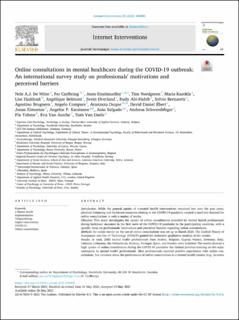Online consultations in mental healthcare during the COVID-19 outbreak: An international survey study on professionals' motivations and perceived barriers
De Witte, Nele A.J.; Carlbring, Per; Etzelmueller, Anne; Nordgreen, Tine; Karekla, Maria; Haddouk, Lise; Belmont, Angélique; Øverland, Svein; Abi-Habib, Rudy; Bernaerts, Sylvie; Brugnera, Agostino; Compare, Angelo; Duque, Aranzazu; Ebert, David Daniel; Eimontas, Jonas; Kassianos, Angelos P.; Salgado, João; Schwerdtfeger, Andreas; Tohme, Pia; Van Assche, Eva; Van Daele, Tom
Peer reviewed, Journal article
Published version

Åpne
Permanent lenke
https://hdl.handle.net/11250/3031264Utgivelsesdato
2021Metadata
Vis full innførselSamlinger
Sammendrag
Introduction While the general uptake of e-mental health interventions remained low over the past years, physical distancing and lockdown measures relating to the COVID-19 pandemic created a need and demand for online consultations in only a matter of weeks. Objective This study investigates the uptake of online consultations provided by mental health professionals during lockdown measures in the first wave of the COVID-19 pandemic in the participating countries, with a specific focus on professionals' motivations and perceived barriers regarding online consultations. Methods An online survey on the use of online consultations was set up in March 2020. The Unified Theory of Acceptance and Use of Technology (UTAUT) guided the deductive qualitative analysis of the results. Results In total, 2082 mental health professionals from Austria, Belgium, Cyprus, France, Germany, Italy, Lebanon, Lithuania, the Netherlands, Norway, Portugal, Spain, and Sweden were included. The results showed a high uptake of online consultations during the COVID-19 pandemic but limited previous training on this topic undergone by mental health professionals. Most professionals reported positive experiences with online consultations, but concerns about the performance of online consultations in a mental health context (e.g., in terms of relational aspects) and practical considerations (e.g., relating to privacy and security of software) appear to be major barriers that hinder implementation. Conclusions This study provides an overview of the mental health professionals' actual needs and concerns regarding the use of online consultations in order to highlight areas of possible intervention and allow the implementation of necessary governmental, educational, and instrumental support so that online consultations can become a feasible and stable option in mental healthcare.
